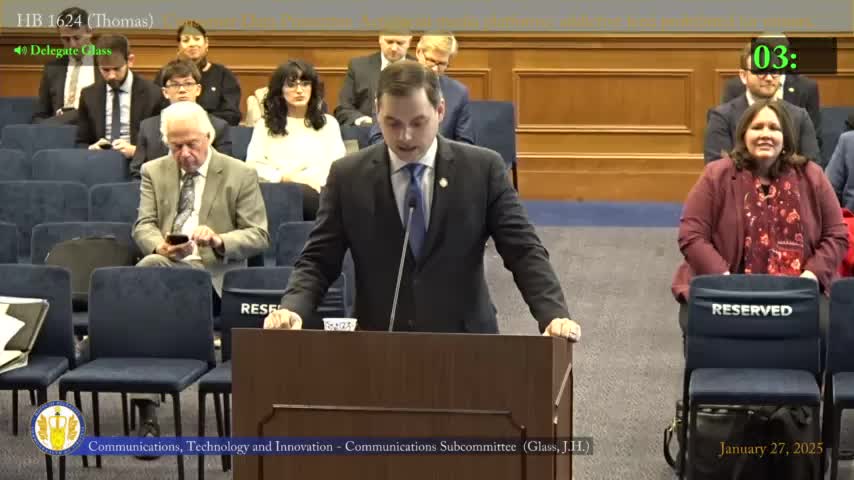Subcommittee tables bill that would require parental consent for algorithmic social media feeds
Get AI-powered insights, summaries, and transcripts
Subscribe
Summary
A Virginia House subcommittee on Thursday tabled HB 1624, a bill that would require parental consent before minors could access algorithmic social media feeds. Supporters said the proposal would protect teens from addictive, harmful content; industry and civil-rights groups warned of legal and practical problems and harms to vulnerable youth.
A Virginia House subcommittee voted to table House Bill 1624 and refer it to the Joint Commission on Technology and Science (JCOT) after mixed testimony from advocates, technology companies and civil-rights groups.
Delegate Delia Thomas, the bill patron, told the subcommittee she introduced the measure to “protect our children” from what she described as the addictive design of algorithmic social media feeds and to reduce exposure to harmful content. She said the bill is narrowly targeted to require parental consent for access to algorithmic, recommendation-driven feeds while preserving users’ ability to access chronological feeds and content they actively “like.”
“The reason I tell you about that personal piece is that ... HB 1624 is about protecting our children,” Thomas said. “This bill would require social media companies to make sure that there is a parental consent component required in order to view algorithmic feeds.”
Supporters urged action, citing research they said links heavy social-media use to worse mental-health outcomes for teens. Opponents, including representatives from Meta, NetChoice, industry trade groups and LGBTQ advocates, said the bill as written would create legal, technical and safety problems.
Jennifer Hanley, Meta’s North American head of safety policy, said the company shares the goal of a safer online experience for teens but argued the bill could produce “unintended consequences” and impose “an unreasonable burden on parents.” She said Meta already offers features for teens such as daily-use notifications, default sensitive-content controls and “sleep mode.” “This bill is well intentioned, but we’re concerned it has unintended consequences that could lead to a less safe, less age-appropriate experience for teens,” Hanley said.
Industry groups, including the Northern Virginia Technology Council and trade associations, warned HB 1624 would likely face constitutional challenges and be difficult to enforce. Several witnesses cited litigation in other states over similar measures and said age verification and parental-consent systems can be circumvented or cut off at-risk youth who rely on online communities for support.
Nerissa Rahaman of Equality Virginia said social media can be a lifeline for LGBTQ youth and warned that a parental-consent regime could block access for youth who have been rejected by caregivers. “For LGBTQ youth, social media is often, more than just an entertainment platform. It’s a lifeline providing access to resources, support groups, and other community members,” she said.
Several committee members said they would welcome further study and stakeholder engagement; Delegate Thomas suggested a delayed enactment clause could be added to address JCOT recommendations. After debate, a motion to table the bill and refer it to JCOT passed on a recorded vote of 7 to 4.
The subcommittee’s action does not decide the bill’s merits; tabling and referral to JCOT directs further study and potential revisions before the measure would return to the committee for a future vote.
Votes at the meeting reflected sharp divisions: proponents emphasized teens’ mental health and the addictive design of algorithmic recommendation systems, while industry and civil-rights witnesses emphasized constitutional risk, enforceability problems and harm to vulnerable youth who rely on online support.
The referral to JCOT signals additional technical work and stakeholder consultations are likely before any substantive changes reach the full House or a floor vote.
